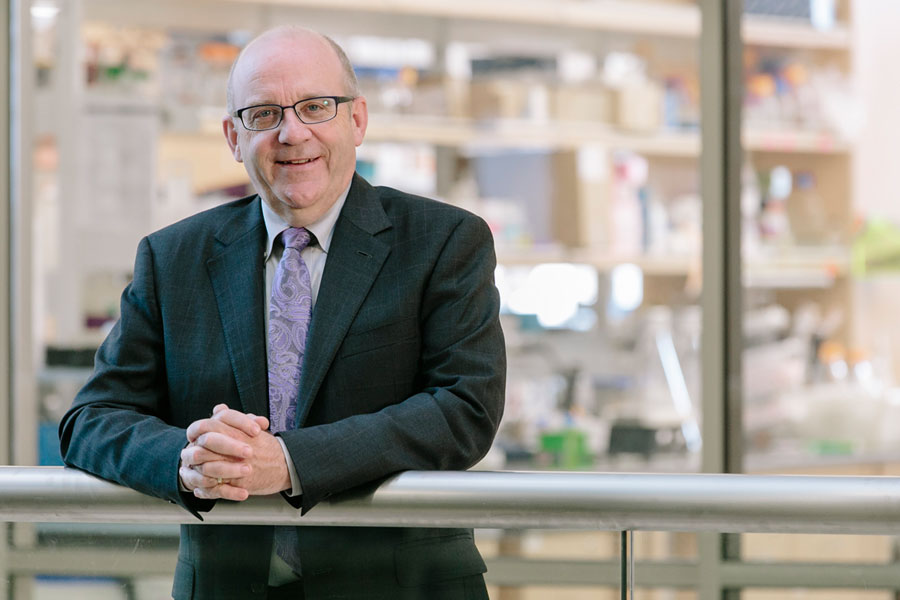Dr. Preston Smith, new dean of medicine: relentless, flexible in restructuring
To be sure, the new dean of medicine at the U of S sees many changes on the horizon for the college but Dr. Preston Smith wonders if there is a group of professionals better prepared for change than doctors.
By Kris Foster "Our faculty members don't treat heart failure the same way as in the past; they fully expect the medicine they practice to be as cutting edge and evidence based as possible, and the medicine we teach should be as well."
"Our faculty members don't treat heart failure the same way as in the past; they fully expect the medicine they practice to be as cutting edge and evidence based as possible, and the medicine we teach should be as well."
Because medical knowledge and research changes so quickly, so too should the schools teaching it, said Smith who stepped into a five-year term as dean June 1, adding he is ready for the challenges and changes that come with his new role.
"There are a lot of drivers for change in medical education, said Smith. "Accreditation is one. Student success on the medical council exams is another. The final thing is Canadian Residency Matching Service competition, and our students' ability to compete for residency spots across the country. That's all about the clinical skills."
But for Smith, it comes down to how fast medical knowledge changes and grows.
"The body of knowledge over time has grown exponentially and so has the curriculum," explained Smith, who most recently held the position of senior associate dean of education at Dalhousie University's Faculty of Medicine. "The estimate by some is that the medical database, in terms of research and new information, is doubling every three years."
In order to keep pace and to address longstanding structural issues that landed the U of S college on probation with the Committee on Accreditation of Canadian Medical Schools, a vision implementation plan called The Way Forward, was created. Turning plan to reality is Smith's immediate priority.
"We must be relentless and flexible as we move forward in implementing our strategic plan. The Way Forward is the entire basis of what we are going to do to change the College of Medicine, get off probation and start becoming a highly competitive research operation," said Smith, who worked on similar issues at Dalhousie to those faced by the U of S.
"I am certainly at an age and stage in my career that I thought I was ready for this challenge. The job I had at Dal for the last five years was a second-in-command role and we did a lot of similar things that need to be done here," he said. "That's why I think I have the experience needed here."
On the research front, the College of Medicine has been underperforming for sometime, and the faculty complement requires a reconfiguration to put more emphasis on clinician scientists, he explained.
"That's not to take away from existing faculty… but if you look across the country, the places that are really successful have a core of physician researchers working collaboratively with the basic science researchers."
The first step towards increased research productivity is to recruit a vice-dean of research who is "truly a leader in that arena." The vice-dean will lead the development of a strategic plan for research with the goal of creating a core of "clinician scientists, doctors and biomedical scientists who work together."
But the U of S college restructuring goes beyond research with an additional focus on medical education.
"There used to be a culture in medicine that as long as you were a doctor you could be a teacher, but now there is growing body of understanding and evidence that training a doctor is a complex process," said Smith, whose background is in medical education. "The Way Forward commits us to hiring more faculty members who are experts in medical education. That's a big step forward and aligned with my interest and values."
Hand-in-hand with recruiting more medical educators is a revamp of the curriculum—specifically moving to what is known as 2+2 curriculum with two years of pre-clinical training followed by two years of clinical training. The old curriculum included about two-and-ahalf years of pre-clinical and one-and-a-half years of clinical work for medical students.
"The emphasis on getting more and more clinical knowledge into medical school is why we're a moving to this curriculum."
The curriculum change will better prepare students for the Medical Council of Canada exams. "These exams have an increased emphasis on practical clinical knowledge and the ability to apply it as opposed to recite knowledge from a textbook. So if that's where the exam is going, then our curriculum had better be going that direction as well." All of these changes will take time, but in the big picture, Smith likes what he sees.
"We will be off probation, there is no doubt in my mind. Our College of Medicine will be known for serving its community, the entire province of Saskatchewan, better than any other Canadian medical school. That means we train the right doctors for the right communities and we have innovative research programs that bring in external research dollars, which drives the economy. When people in Saskatchewan read about us in the paper, they will take pride in the accomplishments of our medical school."

